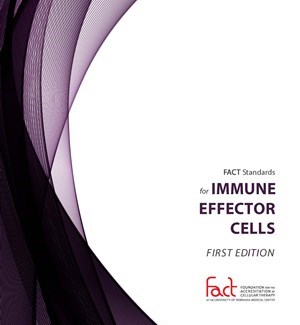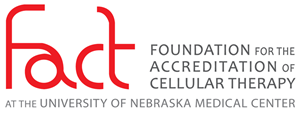Usted está aquí
FACT Standards and Accreditation for Immune Effector Cells
 Immune effector cells are cells from the human body that have differentiated into a form capable of modulating or effecting an immune response. Cells naturally found in the body, such as B cells, dendritic cells, natural killer cells, and T cells are collected, transformed into a therapeutic product, and then administered to a patient. These cellular therapy products are one part of a new pillar of cancer treatment, immunotherapy, which uses a patient’s own immune system to attack tumors.1
Immune effector cells are cells from the human body that have differentiated into a form capable of modulating or effecting an immune response. Cells naturally found in the body, such as B cells, dendritic cells, natural killer cells, and T cells are collected, transformed into a therapeutic product, and then administered to a patient. These cellular therapy products are one part of a new pillar of cancer treatment, immunotherapy, which uses a patient’s own immune system to attack tumors.1
For decades, laboratory scientists and physician investigators have been studying the potential of immune effector cells to help the human body either fight diseases and infections (such as cancer) or to stop attacking itself (in the presence of autoimmune disorders). After setbacks related to adverse effects of genetically engineered cells2, this field has surged thanks to the persistence of researchers and success stories3 that captured the interest of funding organizations, healthcare institutions, and advocacy groups.
A dendritic cell vaccine for prostate cancer was licensed by the Food and Drug Administration (FDA) in 2010.4 Two chimeric antigen receptor (CAR) T-cell products, which are T cells genetically engineered to seek and destroy tumors, have been licensed by the FDA to date5,6 to treat forms of leukemia and lymphoma, with more expected in the next one to three years.
The Foundation for the Accreditation of Cellular Therapy (FACT) published the FACT Standards for Immune Effector Cells7 in 2017 after several stakeholders expressed the need for increased training, process control, and adverse event management systems for collecting, processing, and administering these therapies. Notably, some newer products, especially CAR T-cells, were associated with unusual, unexpected, and serious adverse reactions.8 The FACT Standards are applicable to immune effector cell therapies wherever they are administered, and have already contributed to the safety and quality of clinical trials, regulatory approval, and reimbursement, thereby increasing patient access to these lifesaving cells.
We expect significant growth in many aspects of immune effector cellular therapy, similar to the growth and maturation of hematopoietic stem cell transplantation (HSCT) since FACT was formed over 20 years ago. Not only are there more HSCT programs around the world, but there are more preparative regimens and cell sources.
David Maloney, MD, Medical Director of Cellular Immunotherapy at Fred Hutchinson Cancer Research Center, Medical Director of the Bezos Family Immunotherapy Clinic at Seattle Cancer Care Alliance, and a member of FACT’s Immune Effector Cell Task Force, says, "The current CAR T-cell therapies need to become more effective, more affordable and safer. We need to understand why they do not work for certain people, why they only work in select types of cancer and why they can cause severe, occasionally fatal, side effects."9
Steven Rosenberg, MD, PhD, Chief of the Surgery Branch in the U.S. National Cancer Institute (NCI)’s Center for Cancer Research (CCR), believes recent successes will accelerate progress: "In the next few years I think we’re going to see dramatic progress and push the boundaries of what many people thought was possible with these adoptive cell transfer–based treatments."10
Just a few advancements already being researched in immune effector cellular therapy are additional markers for recognizing tumors, mechanisms to "turn off" immune effector cells when adverse events become too toxic, and allogeneic off-the-shelf products to reduce the time required to give patients the therapy.
Those immune effector cell programs that are FACT-accredited will be educated, trained, and well equipped to safely administer and manage these therapies. Furthermore, with a quality management program that meets FACT Standards, accredited programs will have an advantage in terms of data collection, data analysis, and process controls to further advance the field.
References
- National Cancer Institute, 2017. CAR T Cells: Engineering Patients’ Immune Cells to Treat Their Cancers. Available: https://www.cancer.gov/about-cancer/treatment/research/car-t-cells.
- Stephenson J. Gene Therapy Setback. JAMA. 2003;289(6):691. doi:10.1001/jama.289.6.691-a
- Parker Institute, 2017. From leukemia to cancer-free: how CAR-T immunotherapy saved Emily Whitehead. Available: https://www.parkerici.org/2017/08/30/leukemia-cancer-free-how-car-t-immu...
- Package insert, PROVENGE® (sipuleucel-T). Available here.
- Package insert, KYMRIAH™ (tisagenlecleucel). Available here.
- Package insert, YESCARTA™ (axicabtagene ciloleucel). Available here.
- Foundation for the Accreditation of Cellular Therapy, 2017. FACT Standards for Immune Effector Cells, First Edition.
- Neelapu, S. Chimeric antigen receptor T-cell therapy — assessment and management of toxicities. Nature Reviews Clinical Oncology; doi:10.1038/nrclinonc.2017.148
- Fred Hutchinson Cancer Research Center, 2017. Fred Hutch expert comments on FDA approval of immunotherapy drug Yescarta. Available: https://www.fredhutch.org/en/news/fred-hutch-statement-fda-approval-immunotherapy-drug-yescarta.html
- National Cancer Institute, 2017. CAR T Cells: Engineering Patients’ Immune Cells to Treat Their Cancers. Available: https://www.cancer.gov/about-cancer/treatment/research/car-t-cells.



 Founded in 1996, FACT establishes standards for high quality patient care and laboratory practice in cellular therapies and regenerative medicine. FACT is a non-profit corporation co-founded by the International Society for Cellular Therapy (ISCT) and the American Society of Blood and Marrow Transplantation (ASBMT) for the purposes of voluntary inspection and accreditation in the field of cellular therapy. Visit
Founded in 1996, FACT establishes standards for high quality patient care and laboratory practice in cellular therapies and regenerative medicine. FACT is a non-profit corporation co-founded by the International Society for Cellular Therapy (ISCT) and the American Society of Blood and Marrow Transplantation (ASBMT) for the purposes of voluntary inspection and accreditation in the field of cellular therapy. Visit